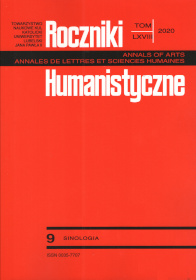Recovering a Lost Voice: Su Tong’s and Yu Hua’s Cathartic Fiction
Recovering a Lost Voice: Su Tong’s and Yu Hua’s Cathartic Fiction
Author(s): Zofia Jakubowicz-ProkopSubject(s): Language and Literature Studies, Studies of Literature, Other Language Literature
Published by: Towarzystwo Naukowe KUL & Katolicki Uniwersytet Lubelski Jana Pawła II
Keywords: Chinese literature; Su Tong; Yu Hua; orality; trauma recovery; counter-history
Summary/Abstract: The Cultural Revolution left deep scars in the memory of the Chinese and strongly influenced Chinese literature, especially those works written by the generation who lived to experience its excesses. Yu Hua’s novels To Live and Chronicle of a Blood Merchant, as well as Su Tong’s Binu and the Great Wall of China, address the problem of the pain and traumas associated with Chinese history. The writers draw upon the traditions of storytelling in an attempt to overcome those traumas by creating new, linear, coherent, and even optimistic, tales about the past experiences of ordinary people, who are given a chance to narrate them against the dominant historical discourse. Walter Ong’s theory of orality and Michel Foucault’s concept of counter-history open up new possibilities of analysis, and help understand these cathartic prose works. A careful reading of Su Tong’s and Yu Hua’s novels also raises the question of the authenticity of the trauma recovery presented, and exposes the risk of complicity with the hegemonic discourse of history in silencing and repressing the traumatic memories that they face.
Journal: Roczniki Humanistyczne
- Issue Year: 68/2020
- Issue No: 9
- Page Range: 139-155
- Page Count: 17
- Language: English

